MegaChange: 10 Trends Reshaping the American Megachurch
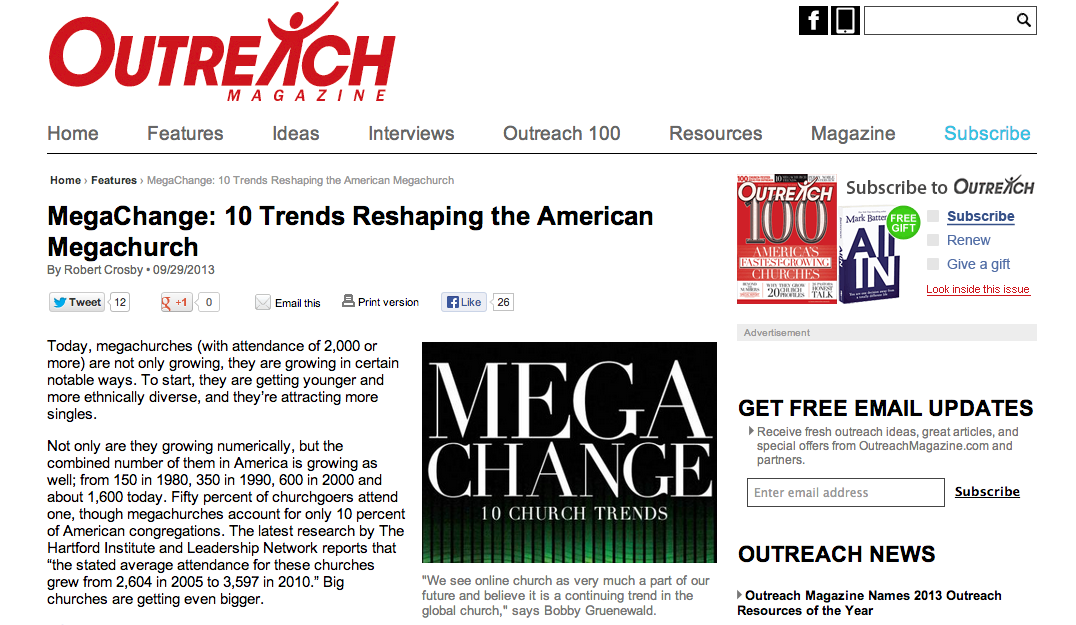 Today, megachurches (with attendance of 2,000 or more) are not only growing, they are growing in certain notable ways. To start, they are getting younger and more ethnically diverse, and they’re attracting more singles.
Today, megachurches (with attendance of 2,000 or more) are not only growing, they are growing in certain notable ways. To start, they are getting younger and more ethnically diverse, and they’re attracting more singles.
Not only are they growing numerically, but the combined number of them in America is growing as well; from 150 in 1980, 350 in 1990, 600 in 2000 and about 1,600 today. Fifty percent of churchgoers attend one, though megachurches account for only 10 percent of American congregations. The latest research by The Hartford Institute and Leadership Network reports that “the stated average attendance for these churches grew from 2,604 in 2005 to 3,597 in 2010.” Big churches are getting even bigger.
Fifteen years ago, business expert Peter Drucker referred in Forbes magazine to the rise in the megachurch movement as “the most important social phenomenon in American society in the last 30 years.” Of course, the movement has grown significantly since he wrote those words.
In their book Beyond Megachurch Myths, Scott Thumma and Dave Travis write that “megachurches, their practices and their leaders are the most influential contemporary dynamic in American religion.” This influence has now superseded that of denominations, seminaries and religious publishing, they say. These older and established institutions are, no doubt, wrestling with these new realities.
Whether or not these claims are overstated, the influence of megachurches undoubtedly continues to grow. Among the evangelical church world today, these megachurches are the prime influencers of leadership development, worship styles and ministry innovation. The pastors who lead them are writing the books most pastors are reading and keynoting the conferences most of them are attending.
While megachurches continue to experience mega-growth, the question emerges: How are they adapting as the culture changes and the megachurch movement matures? What are the megatrends?
1. Timothys on the Rise
In the 1970s and ‘80s in America, with the number of large churches much smaller than today, big church pulpits were even more coveted and selectively filled. Denominations tended to reserve those opportunities for their most “seasoned” pastors—those who were older and had “paid their dues” in ministry.
That trend has changed. The average age of lead pastors in megachurches is getting younger. Today, 25 megachurch pastors range in age from 30 to 37. As of last year, the average age of the lead pastor at the largest 100 churches in America was 47.
Along with this growing number of Timothys has come aging Pauls who are recognizing that the thing their congregation may need the most is for them to make room for younger leaders.
At last year’s general council of the Assemblies of God in Orlando, Fla., J. Don George (long-time megachurch pastor of Irving, Texas’, Calvary Church) talked about making a place for Timothys. When he faced an 18-year-long “plateau” of 3,000 attendees, George said, “God showed me that my church was too old. When I looked in the mirror, I knew it was true. So I told God I would spend the rest of my life making a place for young leaders to emerge.” Today the church is replete with numerous NextGen leaders. Calvary Church is much younger on average and running more than 9,000 in attendance.
2. A Spiritual Formation Reformation
Megachurches are often accused by outsiders of being shallow. Some say: “It’s true they are big, but they are 1,000 miles wide and about one inch deep!” The implication is that while sizeable, megachurches are just not that spiritual.
But, there are clear signs of megachurches digging deeper. Joel Hunter, pastor of Orlando, Fla., megachurch Northland, A Church Distributed, says, “It is slowly sinking in to many megachurches that we live in a culture similar to first century Christianity, where the gospel was advanced in a non-Christian, often hostile environment by making disciples within relational networks.” Spiritual growth is happening in “new” ways, and many megachurches are finding ways to nurture it.
The approaches are moving away from podiums and classrooms to cafés and living rooms. According to Hunter, “The modern institutional paradigm in the West is waning in favor of simpler generic gospel evangelism and discipleship groups.” Programs are out; mentoring is in.
3. The Growing Ethnic Church
Time magazine recently featured a cover story that cited such a significant growth in the influence of Latino evangelicals that it titled the story, “The Latino Reformation: Inside the New Hispanic Church Transforming Religion in America.” The article featured a story on a Latino megachurch in Chicago, New Life Covenant Church, which in 2000 had just 100 members and today has more than 17,000, making it the largest Assemblies of God church in the country.
Wilfredo “Choco” De Jesús, the pastor of New Life Covenant Church, succeeded his Spanish-speaking father-in-law 14 years ago.
De Jesús sees one of his decisions as strategic to the church’s growth: "We started doing English services to reach third-generation Hispanics who love their culture, but prefer to hear a sermon in English. I started doing that, and the church started growing."
Saddleback Church Pastor Rick Warren also saw an opportunity in the Latino emergence several years ago. In the last 10 years he has helped start 35 Spanish-speaking congregations throughout Orange County, Calif., where Saddleback is based.
Black megachurches similarly are on the rise in the United States. In her book The Black Megachurch: Theology, Gender and the Politics of Public Engagement, Tamelyn Tucker-Worgs describes her early encounters with black churches in the D.C. area: “I was simply amazed by the numbers of extremely large black churches that dotted D.C. and its surrounding suburbs. These churches were different from those I had attended back home. … They seemed to be open 24 hours a day, seven days a week, and they seemed to have ‘ministries’ that fulfilled every need one could possibly imagine. … The ministers [preach on] relevant topics from one’s love life to one’s pocketbook. … I was surprised to find that the congregations consisted of young people—young families and single people.”
Twenty years ago the majority of black churches were in urban settings. Today, they are just as frequently found in suburban ones.
4. A Team Culture
Collaboration has become the skill of the age. Many megachurches are no longer simply trying to get people within the church to work together in teams. Now they’re developing what I call teaming cultures.
Craig Groeschel of LifeChurch.tv sees teaming culture as “essential to everything we do to fulfill our mission.”
But do the ingredients of a great ministry team change as churches grow? Are smaller church teams different than megachurch ones? Although LifeChurch.tv has grown from a handful to some 30,000 attendees today, Groeschel says, “The principles of team don’t change based on the size. The only difference now is we are one big team [made up of] many smaller teams.”
Paid megachurch teams today are leaner than they were 10 years ago. And since the recession of 2008, they have learned to accomplish more with less by assigning multiple roles and more efficiently utilizing volunteer teams.
5. Celebrity Pastor or Celebrating the Faithful?
Like many megachurch critics, Wilmer MacNair says in his book, Unraveling the Megachurch: True Faith or False Promises? “The megachurch features a regal pastor who is the church’s head minister and is totally in charge and in control.” However, research shows that the average megachurch pastor, although strong in his leadership gifts, has surrounded himself with a strong team of elders and staff members.
While leading so many people might make celebrity status inevitable, many megachurch pastors are moving the spotlight away from themselves and onto their church’s individual members—often through stories of faith and service, creatively and beautifully told with video and other media. These stories are proving powerfully effective as focal points for nurturing faithfulness and engagement in the entire congregation.
6. Leveraging Church Resources for Social Transformation
Today, many megachurch pastors are discovering the power of helping hundreds as their churches put systems in place to help create social transformation. One example is the Los Angeles Dream Center, affiliated with Angelus Temple and led by Matthew Barnett.
The L.A. Dream Center is housed in the abandoned 15-story, 400,000-square-foot Queen of Angels Hospital building. There are currently over 850 residents living in the facility, people with various life needs and of those who minister to them.
“God is raising up a younger generation of churches that recognize that Sunday is not the destination point,” Barnett says. “It is the launching point to get the church mobilized Monday through Friday.
“Pastors used to believe that what they really needed to succeed was a bigger building than other churches. Now they are rediscovering what a shallow view this was and that the real ministry is among the needs of the people of their communities.”
The Dream Center strategy of holistic ministry has been replicated across the country many times over. Some 7,000 leaders each year come to the Dream Center in L.A. to observe, volunteer and learn. As a result, there are now 200 Dream Centers across the country.
“We are finding out just how simple it can be to live out the gospel,” Barnett says. “We are moving from social justice to social transformation. Social justice is awareness; social transformation is doing something about it.”
7. The Quest for Better Metrics
“We are so over counting ‘nickels and noses,’” says Northland’s Joel Hunter. “Church attendance and finances tell little of how many in the congregation are actually living as disciples and making other disciples on a weekly basis. We are coming up with better surveys like: How many of us belong to a spiritual small group? How many of us have a ministry or area of service for Christ? How many of us have brought someone else to Jesus?"
New technologies are making it easier to examine spiritual fruit in the lives of believers. They are revising how churches lead and serve their members and how they evaluate their level of effectiveness—no longer just from year to year, but from day to day.
“The win is being redefined,” says Ben Cachiaras, pastor of Mountain Christian Church in Joppa, Md. “Attendance, buildings and cash are still worth counting, but now you hear churches getting excited about the changes they feel called to make in their community, as neighborhoods and cities are transformed by the gospel. …These are new metrics.”
8. The Big Church Search for Small Church Intimacy
One of the myths about megachurches is that they are generally distant, aloof, political and impersonal. This is usually true only for those who loosely affiliate with the church, slipping in and out of worship services.
Still, for a big church to become truly strong, it needs to develop lots of smaller “churches” within it, which is why 82 percent say small groups are now essential to their spiritual formation strategies. And many are restructuring to create smaller church experiences within the context of large. This is the case at National Community Church in Washington, D.C. This megachurch, pastored by best-selling author Mark Batterson, consists of six multisite congregations that average about 350 attendees per worship service.
Stewardship of facilities is becoming more desirous, while large buildings occupied for only a few hours a week are becoming old school. This means more churches are becoming multisite. In fact, half of all megachurches today are multisite, and another 20 percent are considering it. Multisite megachurches have also grown faster than single-site megachurches over the past five years.
9. The New Collaborations
Megachurches have begun to form mega-collaborations. While churches have traditionally affiliated along denominational and geographical lines, today more megachurches are affiliating via other networks, and along lines of affinity. Connection points include various summits held across the nation and globally among pastors of larger congregations for interaction, support, fellowship and strategic thinking.
Northland, for instance, has joined an association with other church-based and parachurch organizations, like Campus Crusade for Christ, to plant 5 million churches in the next 10 years. Other groups are partnering around causes like human trafficking, poverty and the need for water wells in developing countries.
Another collaborative trend of the past 10 years is churches affiliating with megachurches. In some cases this is a loose affiliation, like Willow Creek Association, Saddleback’s Purpose Driven Network or LifeChurch.tv. In others, it is a full-fledged incorporation and merger with the megachurch. 10. The Shifting Shape of the Virtual Church
LifeChurch.tv has long been noted for its innovative use of technology. The YouVersion Bible app it created has surpassed 100 million downloads. And you can join the LifeChurch.tv worship experience anywhere via laptop or desktop computer, tablet or mobile phone. Instead of the church you go to, it’s the church that comes to you.
Today LifeChurch.tv literally has thousands of churches in many different languages doing church online, and some 4,000 churches have signed up to use its free Church Online Platform (ChurchOnlinePlatform.com) to host their services. Pastor and Innovation Leader Bobby Gruenewald of LifeChurch.tv notes the growth in the connected church: “Things have definitely changed from when we started. We continue to be passionate about doing ministry in this context and have hundreds of volunteers who invest themselves each week in making it possible. It is a vibrant ministry that is reaching many people who may not have otherwise heard the gospel or been able to connect with a physical church. We see online church as very much a part of our future and believe it is a continuing trend in the global church.”
Also passionate about online ministry, Northland was the first local church to do international concurrent worship in the 1990s via video, at that time connecting Orlando and the Republic of Namibia, in Africa. The church continues to engage worship internationally and concurrently every weekend. However, according to Hunter, “We are seeing now that unless we can plant actual churches in all these sites, the worship we do together will be merely a common experience and not a missional advancement.” Hunter goes on to explain that such “building” is not about physical structures but small groups of people who care for each other spiritually and serve their communities together.
One momentous event in Northland’s concurrent worship model occurred the weekend after the 9/11 attacks on the World Trade Center and the Pentagon. At that time, one of the churches worshipping with Northland via video was located in Cairo, Egypt. Hunter recalls, “I will never forget the bond created by their [real time] prayers and from our hearing directly from their pastor that our Middle Eastern family was with us in spirit and heart.”
SOURCE: Robert Crosby, Outreach Magazine
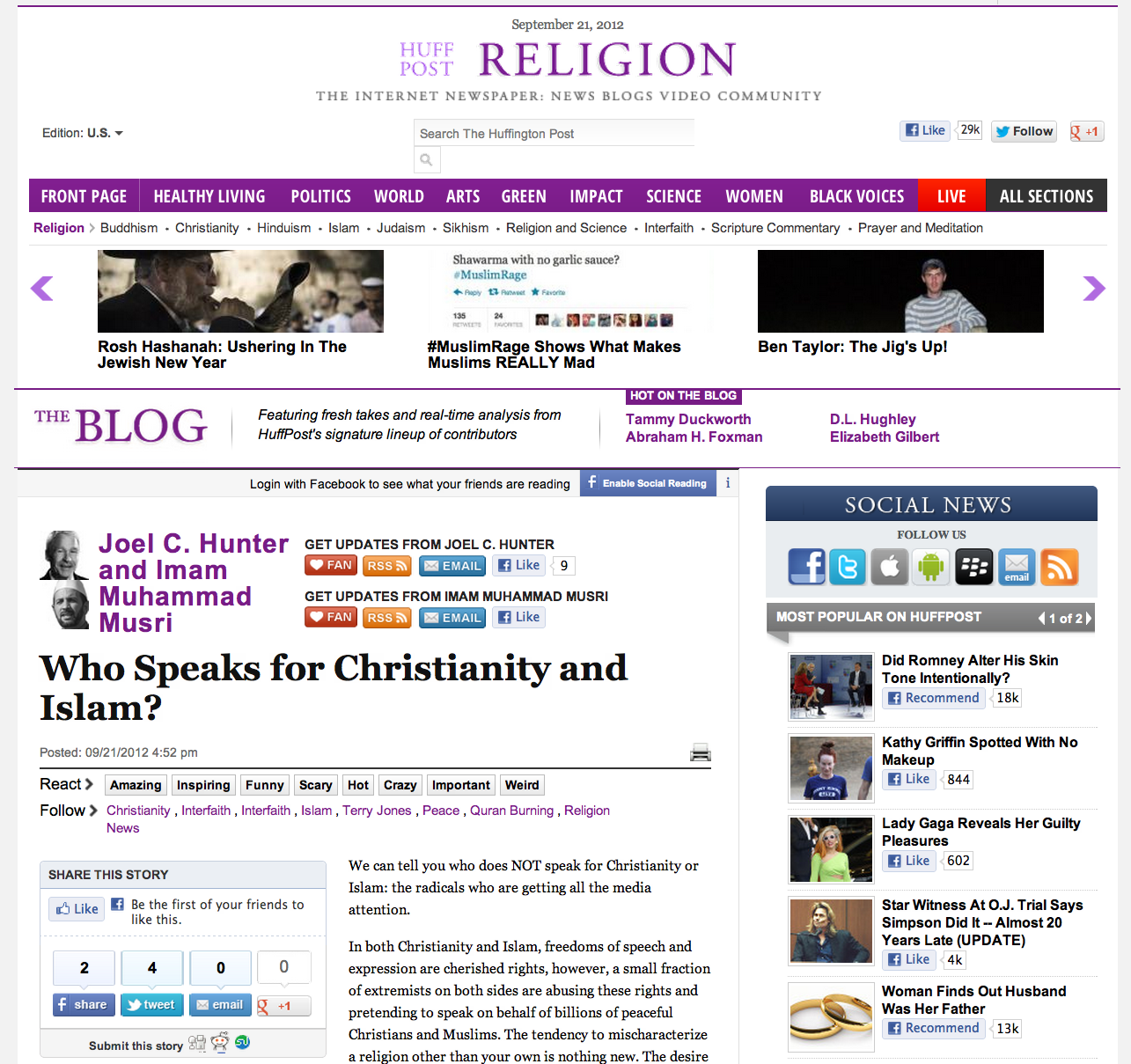

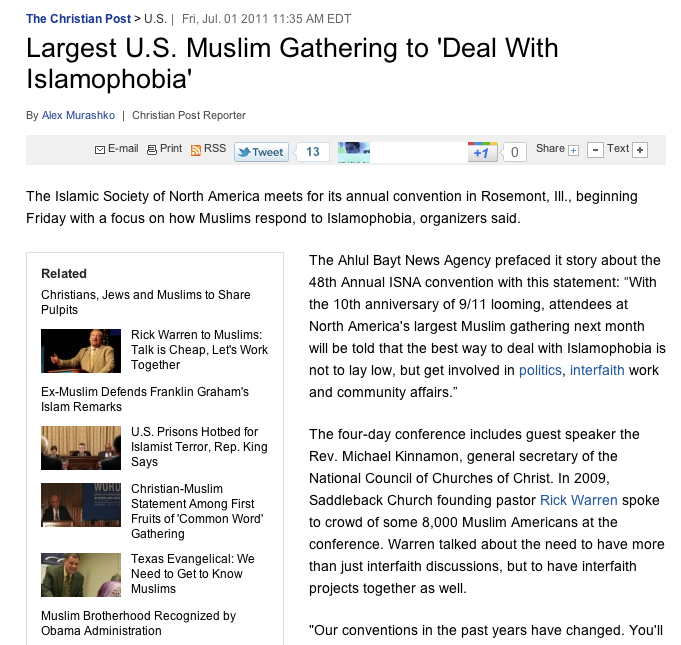
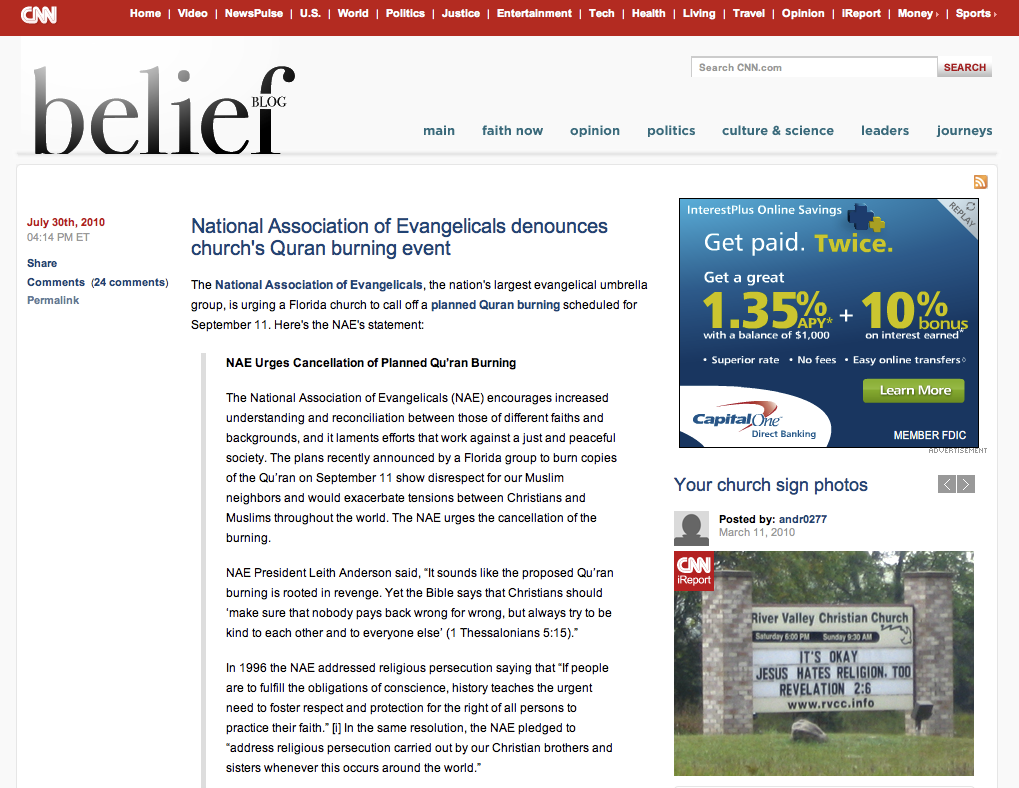
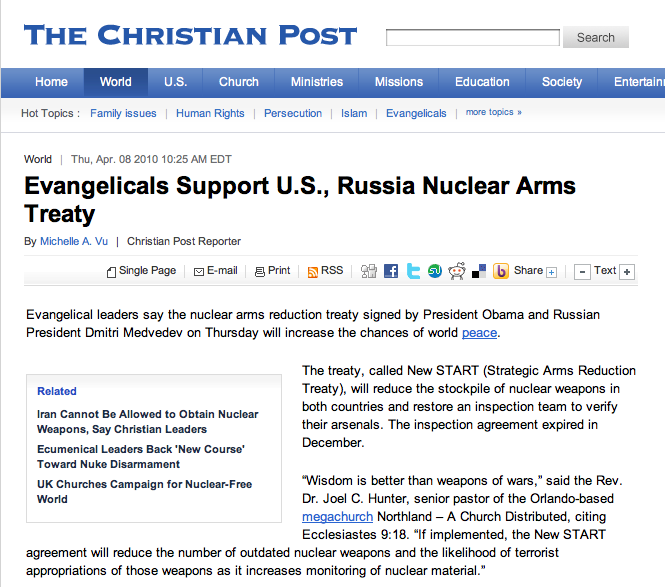
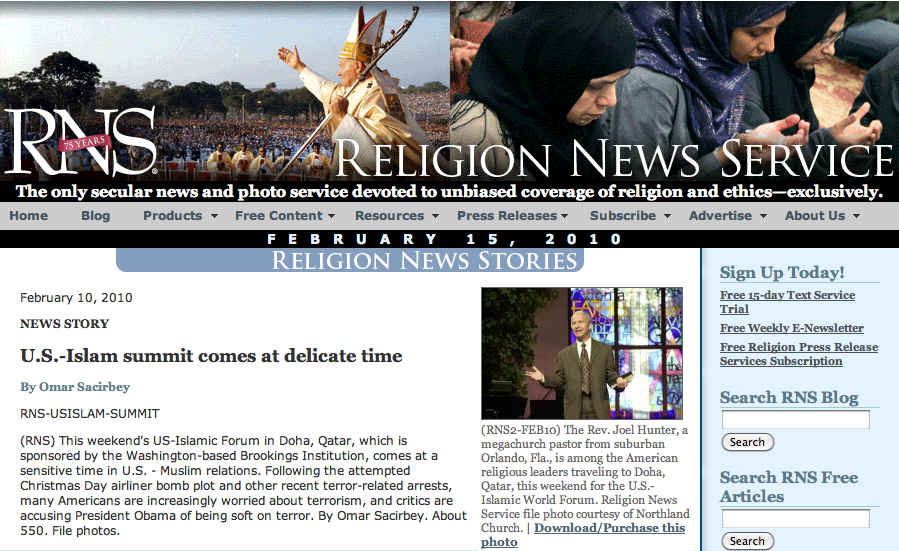 This year’s U.S.-Islamic World Forum, held Feb. 13-15 in Doha, Qatar, comes at sensitive time in U.S.-Muslim relations.
This year’s U.S.-Islamic World Forum, held Feb. 13-15 in Doha, Qatar, comes at sensitive time in U.S.-Muslim relations.
